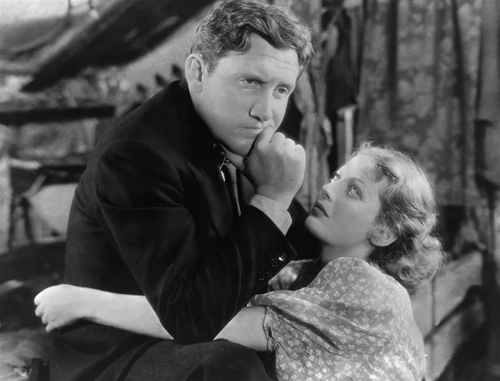
Film Forum's Breadlines and Champagne! series started Friday, February 6th, with 35-cents tickets (25-cents for members) for screenings of the Mae West vehicle, I'm No Angel. A funny little thing about a sexy, driven lady, it was a perfectly "fine" start to the series, which continues through the month, but the real draw of the weekend is a pristine new 35mm print of Frank Borzage's Man's Castle (paired with Capra's not-on-DVD American Madness). The run lasted through Monday night but, looking ahead, the theatre will be offering all kinds of fun and sad ways to stand up and cheer that this new fangled new year may be starting at a low point but will—we hope! we know!—turn up towards the good. And before we know it we all will need a new daily planner. You can see the whole line-up of films at Film Forum's website.
***
A film made to witness the social blight of the Great Depression, released in that earliest and leanest period of the decade before FDR and his New Deal upturn, Frank Borzage's Man's Castle takes on characteristics of its male lead, a young Spencer Tracy, unspooling with patient bemusement and gruff shades of guile. Tracy plays Bill, a man who lives clean and free, taking whatever job will feed him, living most nights under the stars. He prides himself on his independence and, a lot of the time, this no-apologies bluster makes him a prick. All his kindness is masked by toughness, by his brawny bring-it-on posture. Decked in tuxedo and top hat, Bill meets Trina (a wounded Loretta Young, all eyeballs) crumbling popcorn for swans beside The Pond in Central Park. Trina says she hasn't eaten in days and Bill says "Women got nothing to do with the unemployment." When she demures, he goes further to say that there's the river to think about, too. Again she declares herself too afraid to do anything besides starve. So, with a grimace, Bill invites her to dinner.
Although the film offers a pretty simple push-and-pull love story, its charitable optimism—typified by how Borzage smears the lens with light (to point beyond the frame, to point back at the world)—smoothes its frankness. In that first scene (where the city appears as a rear-projection), the swans do not just waddle at Tracy's feet, their feathers' blur bleeds around the little space, a set of beacons bobbing. This molding of the world continues: when not an obvious and limited back-lot set, the city scenes follow routine to show our "subjects" in front of a screened crowd, and never a part of the foot traffic flow; "moonlight" dances on the "Hudson" while the couple skinny dips, racing "to the moon" (a perfect overhead lamp); clouds and balloons laze past windows with weighty grain; a key-light haloes Young in close-up time and again; the whites do not burn the emulsion, as they may in a Von Sternberg film, but rather streak and daub to accent a space, a face, a scene. I've read characterizations of Borzage as inheriting a certain Romantic tradition, and this proves true in that the film sees the wonder in our natural world. However, given all the artifice involved not only in this film but in film on the whole, as it is its own tradition, this is a troublesome tack to take. Somehow Wordsworth writing under a tree about that tree feels more real, or more immediate, than this brand of cinema—or, at least, this Borzage (my first).
You may have guessed: while the film is ostensibly about the Great Depression, and the weight many citizens felt during its run, this is more milieu (a literal backdrop) than subject matter. No, Man's Castle has simpler aims—a modest interest in love's fight for itself. For Borzage, it would seem, love is basic—a form (or shifting forms, arrangements) of servitude. Thus, this story could easily be told in any of our 20th Century decades past—just as it could be told at our current moment. I guess that resonance is the thrill that this retrospective can provide, which is another simple (and, yes, generous) goal. This hope to spark your brain in tandem with your, ahem, heart is typical of any great love, be it for a person or a county; that hope to inhabit the space such a love makes possible. The uplift of the camera, ascending with grace at the close to present a near-Pieta tableau, signals that these souls shuttling towards a new life will find their fulfillment somewhere down the line. We remember—perpetually, pace Cavell—that "America is a place, fictional no doubt, in which that happiness can be found."